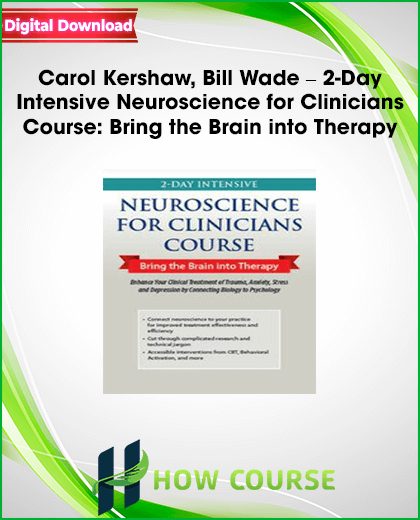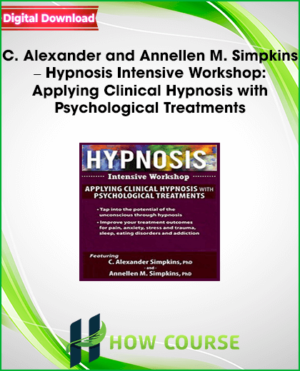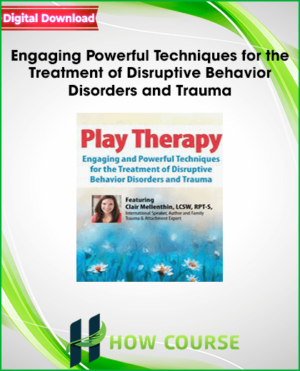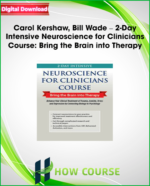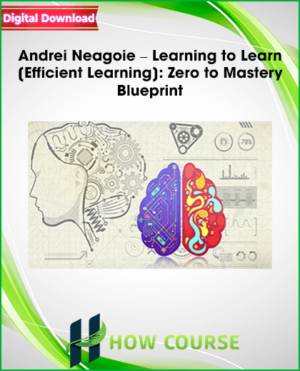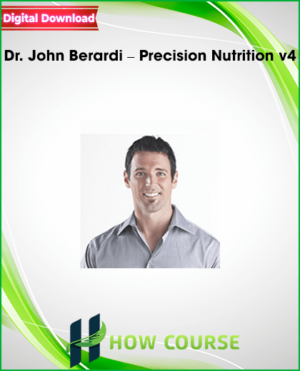Carol Kershaw, Bill Wade – 2-Day Intensive Neuroscience for Clinicians Course: Bring the Brain into Therapy
Faculty:
Carol Kershaw | Bill Wade
Duration:
12 Hours 13 Minutes
Format:
Audio and Video
Copyright:
Nov 08, 2018
Description
You work hard to stay up to date on the latest developments to bring greater healing to your clients. And the field of neuroscience is filled with research that could help you improve effectiveness and efficiency in your practice.
But how do you separate useful information from findings that aren’t relevant to clinical work? How do you distinguish meaningful discoveries from dubious, even dangerous, pseudoscientific claims? And how do you link complicated scientific information to the real-world treatments you need to help clients with the mental health issues they face each day?
This recording will connect the latest findings in the fields of neuroscience and neurobiology to therapeutic interventions you can apply to everyday clinical situations. You’ll discover why neuroscience matters to therapy and learn to apply practical and adaptable tools based in cognitive therapy, attachment, mindfulness, behavioral activation, and positive psychology to the treatment of anxiety, stress, trauma, and depression.
Don’t let confusing scientific jargon and research lead you toward risky misunderstandings or keep you from upgrading your practice by adding a neuroscience informed approach to your clinical work.
Cut through the frustrations of interpreting complex scientific research, and build the confidence you need to bring the brain into therapy!
Handouts
Manual – 2-Day Intensive Neuroscience for Clinicians Course (14.9 MB) 109 Pages Available after Purchase
Outline
Motivate and Engage Your Clients with Neuroscience
Simple explanations on brain structure and function
The neurobiology of specific disorders
You can change – neuroplasticity and the potential for transformation
Teach Clients About Brain Health
Sleep quality and mood
Nutrition
The habit of exercise
The value of social support
Detrimental impacts of stress
How the Neurobiology of Attachment and Relationships Informs Your Clinical Practice
Neurobiological basis of attachment
How relationships impact our brains
Mirror neurons, empathy and connecting with others
Oxytocin and the individual self
How attachment style impacts your clients’ relationships
Attachment and attunement in the therapeutic relationship
Trauma: Connect the Neurobiology of Trauma to Treatment
Childhood trauma and the trajectory of brain development
The fight/flight/freeze response
Implicit memory and the limbic system
Clinical techniques:
Trigger identification
Exposure
Guided imagery
Grounding strategies
Anxiety and Stress: Regulate Emotion and Interrupt Anxious Rumination
How the brain is organized – and how it organizes
Homeostasis, stress pathways and stress responses
The resting state – the parasympathetic nervous system and mental health
Emotional and thinking circuits, and perception of control – and why this matters to therapy
Clinical techniques:
Mindful awareness of emotions – labeling emotions
Interventions that shift focus away from anxious rumination
Interrupt worry patterns with physical exercise
Diaphragmatic breathing exercises to regulate emotion
Resiliency – susceptibility to stress-based damage
Depression: Techniques to Intervene in the Downward Spiral
The limitations of medication-based treatment
Brain circuits involved in positive and negative emotion
The brain’s negativity bias and depression risk
The amygdala in the depressed brain
The downward spiral
Reconstructed memories
Clinical techniques:
Behavioral Activation – get out of your head and into your life
Cognitive therapy tools – problem solving skills in the treatment plan
The psychology of obtainable goals
Self-compassion as a buffer to depressive symptoms
Neurocognitive Health Checkup
Test of Variable Attention (TOVA)
Mood evaluation
Biochemical dysfunction and depression
Measuring memory
Brain injury
Neurofeedback
Simple Biofeedback Tools for Regulating Physiological Responses
Physiological control and psychology
Biofeedback games
Controlled breathing
Heart Rate Variability
EEG biofeedback training
Distractibility and the Brain: Cognitive Costs in the Land of Information Overload
The myth of multitasking – Multitasking vs. task switching
Synaptic pathways, mental states, memory and learning
The pre-frontal cortex and flexible goal directed behavior
Teach clients coping strategies that can:
Reshape detrimental behavioral patterns
Decrease distractions
Build organizational and time management skills
The Neuroscience of Positive Psychology
The science behind gratitude
Overcome barriers to practicing gratitude
Easy-to-use gratitude exercises
The neuroanatomy of forgiveness
Strengths-based interventions
Flow states
Merge action with awareness
Flow, the prefrontal cortex, and the inner critic
Research limitations of positive psychology approaches
The Limitations of Neuroscientific Research and Potential Risks
fMRI imaging
Things to keep in mind regarding animal studies
Simple explanations for complicated processes
Research limitations, and treatment risks
Faculty
Carol Kershaw, Ed.D.
Carol Kershaw, Ed.D., is a licensed psychologist and co-director of the Milton Erickson Institute of Houston and co-author of Brain Change Therapy: Clinical Interventions for Self Transformation (2012 WW Norton), co-author of The Worry Free Mind (Career Press) and author of The Couple’s Hypnotic Dance (Brunner/Mazel). She is board certified in Neurofeedback, a member of the American Psychological Association, and approved consultant for the American Society of Clinical Hypnosis. She is an international trainer and is a frequent presenter in the states on the most cutting edge interventions based in neuroscience and hypnosis. Carol has been featured on ABC, CBS, Fox and NBC for her cutting-edge work.
Speaker Disclosure:
Financial: Carol Kershaw receives royalties as an author for W.W. Norton and Company. She receives a speaking honorarium from PESI, Inc.
Non-financial: Carol Kershaw has no relevant non-financial relationship to disclose.
Bill Wade
Bill Wade, M.Div., LPC, LMFT is a licensed professional counselor and marriage and family therapist, author and international trainer. Co-director of the Milton Erickson Institute of Houston he is also a co-author of Brain Change Therapy: Clinical Interventions for Self-Transformation and The Worry Free Mind: Train Your Brain, Calm The Stress Spin Cycle, and Discover a Happier, More Productive You. Bill has taught extensively in the states on neuroscience and has also taught meditation and given Dharma lectures at various Buddhist temples.
Speaker Disclosure:
Financial: J. William Wade maintains a private practice. He receives royalties from W.W. Norton, Amazon Books and CDS. He receives a speaking honorarium from PESI, Inc.
Non-financial: J. William Wade is a member of the American Association for Marriage and Family Therapy; American Counseling Association; and Texas Association for Marriage and Family Therapy.
> Please contact our team if you have questions, or broken links via our email [email protected].

